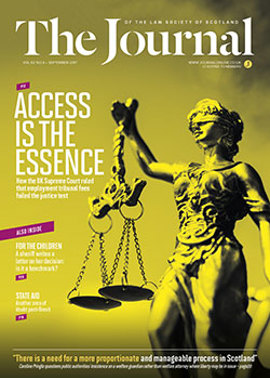Moveable property: reform at last?

Practitioners will be aware that it can be pernickety to obtain security over moveable assets in Scotland. Moveable assets include corporeal property, and incorporeal property such as intellectual property, debts or claims. Moveable property more often than not constitutes a significant part of the lifeblood of a business, and difficulties with the current law in using moveables to obtain funding can often prove a disincentive for businesses to use Scots law, or lead to complex contractual arrangements.
Moveable Transactions (Scotland) Bill
With this in mind, the Scottish Law Commission (SLC) has been working to provide much sought-after reform and produced the draft Moveable Transactions (Scotland) Bill. This large project focused on three main areas: assignation (transfer), security over incorporeal property and security over corporeal property.
Given the scale of the task, a covering note mentions the areas of law which could not be reviewed (such as diligence, insolvency and international private law) but which have been taken into account in the SLC’s recommendations. Similarly it required to work with existing Westminster reserved legislation (such as IP legislation, which explains why the UK rules in relation to registering security over registered IP will continue to apply), while keeping an eye on current proposals for reform in this area, especially in England.
Transfer and security issues
The SLC notes that one of the most common forms of incorporeal property are claims, such as rights under contracts and debts. At present under Scots law the transfer of a claim requires assignation, which can only be completed by notification (“intimation”) to the debtor under the Transmission of Moveable Property (Scotland) Act 1862. This means that if a creditor purchases a debt, ownership will not pass until intimation has been given. The requirement causes difficulties, and sometimes an impossible administrative burden, when multiple debts are bought, and also means that future debts cannot be assigned.
A problem in relation to obtaining security over incorporeal property is that the asset must be transferred to the creditor, and this can only happen once (except for floating charges). This means that for IP particular arrangements need to be made to allow its licensing.
For corporeal security, in the main, the only express security available is the possessory pledge. This can only be created by actual delivery of an asset to a creditor, as with a pawnbroker. For asset finance, this is commercially unworkable if a business cannot deliver the assets or requires to use them to pay off the debt.
Frequently solicitors turn either to English law, which allows fixed charges over incorporeal movable property and non-possessory charges over corporeal movables, or where possible, to convoluted contractual mechanisms to allow the security or transfer.
What the SLC proposes
The bill proposes reforms in relation to the assignation of claims, to update and clarify Scots law. These include that an assigned claim can be transferred to the assignee by intimation or registration; a claim must be assigned by an assignation document; and a claim that is yet to exist can be assigned. Explanatory notes to the draft bill provide examples as to when a claim (including a future claim) is identifiable and so capable of transfer. A “claim” is now defined as the right to the performance of an obligation, with exceptions in relation to: (1) heritable property (apart from monetary rights relating to land, such as assignation of rents); and (2) negotiable instruments (where the existing law applies).
The bill envisages a document registration approach, with two new registers which would allow electronic transactions, automatic registration and online searches: (1) a Register of Assignations, to allow registration as an alternative to intimation; and (2) a Register of Statutory Pledges, with pledges being created by the process of registration (as opposed to delivery).
Statutory pledge as a new form of fixed security right represents one of the most significant innovations proposed. It would be a real form of security applying to corporeal and incorporeal property, although for incorporeal property this would be limited to IP and financial instruments (as these represent some of the most popular incorporeal property in need of reform, and for other pragmatic reasons explained in the SLC’s covering note). The provider of the pledge can keep possession of the secured property; however the property will continue to be encumbered if it is transferred without explicit consent of the secured creditor to the particular transfer (so it will not operate in the same way as a floating charge).
What happens next
Comments on the latest draft bill closed on 11 August, and the SLC hopes to publish its report by the end of 2017. Hopefully Scots law will be on its way to a long-awaited reform in this area.
In this issue
- Talaq and the growing challenge of overseas divorces
- Too close to the wind? (1)
- The Land Register: two ticking timebombs
- Adult ADHD: a performance management issue
- Reading for pleasure
- Opinion: Sandra McDonald
- Book reviews
- Profile
- President's column
- ScotLIS enters user test phase
- People on the move
- Priced out of justice
- The residence nil rate band – are your clients affected?
- State aid outside the EU
- IP actions at the Court of Session
- Give me liberty or give me a welfare attorney
- Personal injury trusts and professional trustees
- How to protect your firm and your clients from email fraud
- Court to child: a different approach
- Who can appeal a contempt ruling?
- Moveable property: reform at last?
- Too close to the wind?
- Limited partnerships and the PSC register
- Scottish Solicitors' Discipline Tribunal
- Recent changes to the PSG offer to sell
- Assigned standard securities
- On our own feet
- OPG tackles rising demand for PoAs
- Law reform roundup
- PI court timetable amended
- Reception greets Accredited Paralegal scheme
- Making paper history
- Your Law Society of Scotland Council members
- Master Policy renewal: it's easy online
- Ask Ash
- AML risks and company services
- Thinking of getting engaged?
- Q&A corner






